Gardener Orpington: Your Comprehensive Guide to a Thriving Garden
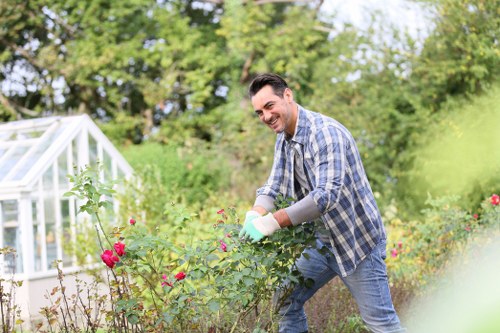
Orpington, a vibrant town nestled in the heart of Southeast London, offers a unique environment for gardening enthusiasts. Whether you're a seasoned gardener or just starting out, understanding the local climate, soil conditions, and plant varieties is crucial for cultivating a beautiful and sustainable garden.
The region benefits from a temperate maritime climate, characterized by mild winters and warm summers, making it ideal for a wide range of plants. However, gardeners must also contend with factors such as soil pH, drainage, and sunlight exposure to ensure their gardens thrive.
In this comprehensive guide, we'll explore the best practices for gardening in Orpington, highlight the most suitable plants, and provide tips on maintaining your garden throughout the year.
The Climate of Orpington and Its Impact on Gardening
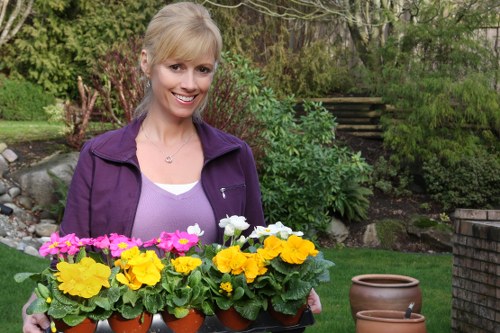
Orpington's climate plays a significant role in determining the types of plants that can be successfully grown. With an average annual rainfall of around 600mm and temperatures ranging from 2°C in winter to 25°C in summer, gardeners have a wide palette of options.
The area's climate supports both hardy perennials and delicate annuals, allowing for diverse garden designs. It's important to select plants that can withstand occasional frost and extended periods of sunshine to ensure year-round beauty.
Additionally, understanding the seasonal changes can help gardeners plan their planting schedules effectively, ensuring that each plant has the optimal conditions for growth.
Soil Conditions in Orpington
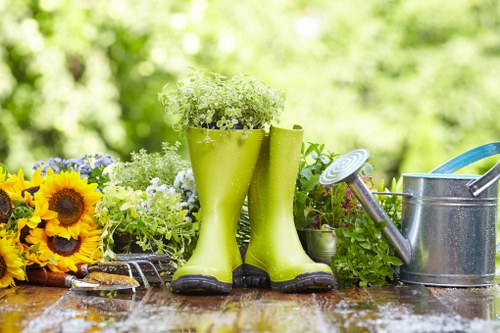
The soil in Orpington varies from sandy loam to clay, influencing water retention and nutrient availability. Testing your soil's pH is essential, as most garden plants prefer a slightly acidic to neutral pH between 6.0 and 7.0.
Improving soil quality can be achieved by adding organic matter such as compost or well-rotted manure. This not only enhances fertility but also improves soil structure, ensuring better root growth and moisture retention.
For gardeners dealing with heavy clay soils, incorporating gypsum can help break up the soil, improving drainage and reducing compaction. Conversely, sandy soils benefit from the addition of organic mulch to retain moisture and provide essential nutrients.
Choosing the Right Plants for Orpington Gardens
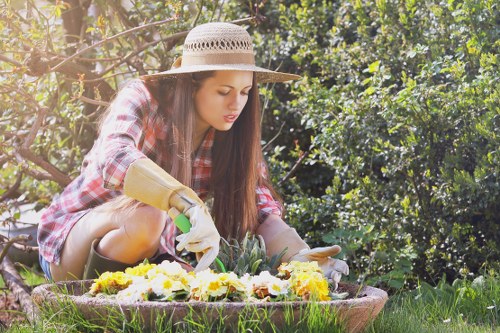
Selecting plants that are well-suited to Orpington's climate and soil is pivotal for a flourishing garden. Native plants tend to perform better as they are adapted to local conditions, requiring less maintenance and care.
Popular choices include lavender, roses, and hydrangeas, which thrive in the region's temperate climate. Additionally, fruit trees such as apple and pear varieties can be successfully cultivated, offering both ornamental and practical benefits.
For shade areas, consider plants like hostas and ferns, which tolerate lower light conditions. In sunny spots, vibrant annuals like marigolds and petunias can add color and attract pollinators to your garden.
Garden Design and Layout
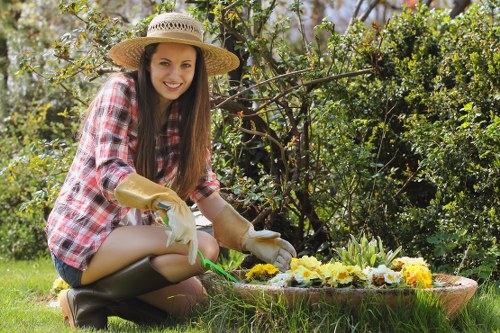
A well-planned garden layout enhances both functionality and aesthetics. Start by assessing the available space and deciding on the primary purpose of your garden, whether it's for relaxation, growing vegetables, or entertaining guests.
Incorporate pathways to facilitate movement and create distinct areas for different plant types. Using raised beds or containers can help manage soil quality and make gardening more accessible.
Consider adding features such as pergolas, water fountains, or seating areas to add interest and provide focal points within your garden. Proper lighting also extends the usability of your garden into the evening hours.
Seasonal Gardening Tips for Orpington
Gardening is a year-round activity, and each season brings its own set of tasks and opportunities. Here's how to make the most of each season in Orpington:
- Spring: Prepare your garden beds by removing weeds and adding compost. Plant early blooms like tulips and daffodils to usher in the growing season.
- Summer: Focus on maintaining your garden by watering regularly and controlling pests. This is the ideal time to plant heat-loving annuals.
- Autumn: Harvest vegetables and fruits before the first frost. Clean up fallen leaves and mulch to protect plants during winter.
- Winter: Plan your garden layout for the coming year. Protect sensitive plants with frost covers and focus on indoor gardening projects.
By staying on top of seasonal tasks, gardeners in Orpington can ensure their gardens remain vibrant and productive throughout the year.
Pest and Disease Management
Managing pests and diseases is critical to maintaining a healthy garden. Common pests in Orpington include aphids, slugs, and snails, which can damage a variety of plants.
Implementing natural pest control methods, such as encouraging beneficial insects like ladybugs and using organic repellents, can help reduce pest populations without harming the environment.
Regularly inspect plants for signs of disease, such as discoloration or wilting. Promptly remove affected leaves or stems and consider using fungicides for more severe issues.
Watering Techniques for Optimal Growth
Proper watering is essential for plant health. In Orpington, the amount of rainfall can vary, so gardeners must adjust their watering schedules accordingly.
It's best to water plants in the early morning or late evening to minimize evaporation and ensure that water reaches the roots effectively. Using drip irrigation systems can provide consistent moisture while conserving water.
Mulching around plants helps retain soil moisture and reduces the frequency of watering needed, making it an efficient practice for busy gardeners.
Tools and Equipment Every Gardener Needs
Having the right tools can make gardening more enjoyable and efficient. Essential tools for Orpington gardeners include:
- Hand Trowel: Ideal for digging small holes and planting bulbs.
- Pruning Shears: Essential for trimming and shaping plants.
- Garden Fork: Useful for aerating soil and removing weeds.
- Watering Can or Hose: Necessary for keeping plants hydrated.
- Garden Gloves: Protect your hands while working with plants and soil.
Investing in quality tools ensures durability and better performance, making your gardening tasks easier and more effective.
Local Resources for Orpington Gardeners
Orpington offers a wealth of local resources to support gardeners. From nurseries and garden centers to community groups and workshops, there are plenty of opportunities to learn and grow.
Local nurseries provide a wide selection of plants suited to the Orpington climate, while garden centers offer tools, soil amendments, and expert advice. Joining a gardening club can connect you with fellow enthusiasts and provide access to shared knowledge and experiences.
Additionally, various workshops and classes are available throughout the year, covering topics such as organic gardening, landscape design, and pest management. Taking advantage of these resources can enhance your gardening skills and help your garden flourish.
Sustainable Gardening Practices
Embracing sustainable gardening practices not only benefits the environment but also leads to a healthier and more resilient garden. Here are some key principles to consider:
- Composting: Recycle kitchen scraps and garden waste to create nutrient-rich compost for your plants.
- Water Conservation: Use rain barrels to collect rainwater and implement efficient watering systems like drip irrigation.
- Organic Fertilizers: Opt for natural fertilizers to avoid harmful chemicals and promote soil health.
- Diverse Planting: Plant a variety of species to encourage biodiversity and reduce the risk of pests and diseases.
- Mulching: Apply organic mulch to retain moisture, suppress weeds, and improve soil structure.
By adopting these practices, Orpington gardeners can contribute to a more sustainable and thriving ecosystem.
Gardening Events and Exhibitions in Orpington
Staying engaged with the local gardening community can provide inspiration and valuable insights. Orpington hosts several events and exhibitions throughout the year, celebrating the art and science of gardening.
Events such as garden shows, plant fairs, and seasonal festivals offer opportunities to explore new plant varieties, discover innovative gardening techniques, and connect with industry experts.
Participating in these events can provide fresh ideas for your garden, allow you to network with other gardeners, and keep you updated on the latest gardening trends and practices.
Indoor Gardening in Orpington
For those with limited outdoor space or who wish to extend their gardening year-round, indoor gardening is an excellent option. Orpington's climate allows for a variety of indoor plants that can thrive with proper care.
Popular indoor plants include succulents, herbs, and flowering houseplants like orchids and peace lilies. Utilizing natural light, or supplementing with grow lights, ensures that indoor plants receive the necessary energy for growth.
Indoor gardening also offers psychological benefits, providing a sense of accomplishment and a touch of nature within the home environment.
10 Nearby Areas to Orpington for Gardeners
Orpington is surrounded by several charming areas, each offering unique features and opportunities for gardening enthusiasts.
- Bromley: Just west of Orpington, Bromley boasts expansive parks and gardens, including the renowned Chislehurst Caves, perfect for plant exploration.
- Beckenham: Known for its beautiful Beckenham Place Park, it offers ample space for gardening activities and community gardening projects.
- Crayford: Located to the north, Crayford provides fertile grounds ideal for vegetable gardens and allotments.
- St Mary Cray: To the northeast, this area features lush green spaces and local nurseries supporting avid gardeners.
- Petts Wood: Southeast of Orpington, Petts Wood is renowned for its expansive woodland, offering inspiration for garden designs.
- Elmstead Park: A short distance away, Elmstead Park provides a serene environment for gardening retreats and workshops.
- Orpington Green: Surrounding Orpington, Orpington Green is perfect for community gardens and shared planting spaces.
- Orpington Station: Easily accessible, Orpington Station area hosts several garden centers and plant suppliers.
- Plantation: North of Orpington, Plantation offers excellent soil conditions for a variety of plant species.
- Lesnes Abbey: Close to the town center, Lesnes Abbey Park is a historic site with beautiful gardens and botanical diversity.
- Downe: This nearby village is known for its picturesque gardens and traditional gardening methods.
- Kent: Surrounding Orpington, Kent provides a rich agricultural heritage, offering numerous gardening resources and expertise.
- Purnell Park: Located nearby, it is a popular spot for gardening enthusiasts to showcase their best plants and designs.
- Farnborough: To the west, Farnborough supports gardeners with extensive market gardens and plant nurseries.
Each of these areas contributes to the vibrant gardening community in and around Orpington, providing ample resources and inspiration for both novice and experienced gardeners.
Maintenance Tips for a Healthy Garden
Regular maintenance is key to ensuring a healthy and attractive garden. Here are some essential maintenance tips for Orpington gardeners:
- Pruning: Regularly trim plants to encourage healthy growth and remove dead or diseased branches.
- Weeding: Keep the garden free from weeds that compete with your plants for nutrients and water.
- Mulching: Apply mulch to retain soil moisture, regulate temperature, and suppress weed growth.
- Fertilizing: Provide plants with necessary nutrients through organic or synthetic fertilizers as needed.
- Pest Control: Monitor for pests and take prompt action to prevent infestations.
By staying consistent with these maintenance tasks, gardeners can enjoy a lush and vibrant garden all year round.
Incorporating Wildlife into Your Garden
A garden that supports wildlife is not only beautiful but also contributes to the local ecosystem. Orpington gardeners can create habitats for beneficial insects, birds, and other wildlife.
Planting a variety of flowers that bloom at different times ensures a steady food source for pollinators. Installing birdhouses and water features can attract birds and other creatures, enhancing the biodiversity of your garden.
Providing shelter through dense shrubs and leafy plants creates safe havens for small animals, promoting a balanced and thriving garden environment.
Gardening on a Budget
Gardening doesn't have to be expensive. Here are some tips for maintaining a beautiful garden in Orpington without breaking the bank:
- Start Small: Begin with a manageable garden size and expand as your skills and resources grow.
- Reuse and Recycle: Use recycled containers and repurpose old items as planters or garden decor.
- Grow from Seeds: Starting plants from seeds is more cost-effective than purchasing mature plants.
- Compost: Create your own compost from kitchen scraps to reduce waste and provide free fertilizer.
- Buy in Bulk: Purchase seeds and supplies in bulk to take advantage of discounts.
By implementing these strategies, gardeners can cultivate a thriving garden while staying within their budget.
Conclusion: Embrace the Gardening Journey in Orpington
Gardening in Orpington offers endless possibilities for creativity, relaxation, and connection with nature. By understanding the local climate, soil conditions, and suitable plant varieties, gardeners can create stunning and sustainable gardens.
Utilizing local resources, participating in community events, and adopting sustainable practices further enhance the gardening experience, ensuring that your garden not only thrives but also contributes to the beauty and biodiversity of Orpington.
Whether you're cultivating a small balcony garden or managing a sprawling backyard, the tips and strategies outlined in this guide will help you achieve a flourishing garden that brings joy and satisfaction throughout the year.
Frequently Asked Questions
1. What are the best plants for beginners in Orpington?
For beginners, hardy plants like lavender, marigolds, and hostas are ideal. They are easy to grow, require minimal maintenance, and are well-suited to Orpington's climate.
2. How can I improve soil quality in my Orpington garden?
Adding organic matter such as compost or well-rotted manure enhances soil fertility and structure. Conducting a soil pH test and adjusting accordingly also improves soil quality.
3. What is the best time to plant bulbs in Orpington?
The best time to plant bulbs like tulips and daffodils is in the autumn, allowing them to establish roots before the winter.
4. How do I manage pests organically?
Encouraging beneficial insects, using natural repellents, and maintaining garden hygiene are effective organic methods for managing pests.
5. Can I grow vegetables in Orpington?
Yes, Orpington's climate is suitable for a variety of vegetables, including tomatoes, carrots, and beans. Ensure proper soil preparation and regular watering for optimal growth.